#and by gay in this case I mean Queer but in the shorthand way that lets me do a fun alliteration
Explore tagged Tumblr posts
Text
"How dare you touch him, any of you? How dare you cast eyes on him when I had forbidden it? Back, I tell you all! This man belongs to me! Beware how you meddle with him, or you'll have to deal with me." The fair girl, with a laugh of ribald coquetry, turned to answer him:—
"You yourself never loved; you never love!" On this the other women joined, and such a mirthless, hard, soulless laughter rang through the room that it almost made me faint to hear; it seemed like the pleasure of fiends. Then the Count turned, after looking at my face attentively, and said in a soft whisper:—
"Yes, I too can love; you yourselves can tell it from the past. Is it not so? Well, now I promise you that when I am done with him you shall kiss him at your will. Now go! go! I must awaken him, for there is work to be done."
I can't help but wonder how the 1890s audience reacted to Dracula's very unhetero behaviour here...
#Dracula#Dracula Daily#I am TELLING you the gothic genre is for the girls and the gays#and by gay in this case I mean Queer but in the shorthand way that lets me do a fun alliteration#Goths Girls and Gays
21 notes
·
View notes
Text
When my wife and I first started fucking dating, we had a shorthand phrase we would exchange when someone was being...some kind of way about gender and sex and sexuality...to sort of indicate to each other what we thought was happening.
"I see we've decided to round to the nearest dick."
See, wifey and I are both trans and bisexual in REALLY similar ways, but with different AGABs right? And we noticed with time that interesting trends showed up. For me, people, even those who know I'm bisexual, treat me like they would treat me as a straight person in their life. Wifey often gets treated like loved ones treat exclusively gay people. Then with gender it's similar! People assume I *don't* have a dick and so they treat me like they would treat [failed] women in their lives. They assume Wifey DOES have a dick and treat her like they would treat a [failed] man in their life. Even beyond that, when wifey and I are TOGETHER, we are automatically defaulted into the "straight" category or the "gay" category depending on which of us (how many of us) they are assuming has a dick, and then defers authority in the relationship to whoever they think has the dick.
It's all gender essentialism all the way down, and interrelated essentialism across the whole spectrum, butit shows up in different ways depending on how people perceive our relationship to our genetalia
And it IS about our genetalia because it almost always gets explicit about it at some point.
I think what I've always found the most interesting is how other queer and trans folks interact with the concept of rounding to the nearest dick, including how we as a community wield it against each other laterally. The experience of being called "basically a woman" by lesbian partners in order to reconcile their discomfort with my gender (as distinct from lesbian partners whose reconciliation of my gender with their sexuality involved calling THEMSELVES "basically alesbian" or some similar iteration that emphasized the importance/meaning of THEIR identity WITHOUT commenting on my own) while Wifey gets treated like "basically a man" because of how race, gender, and sexuality intersect for her. The experience of being told I am excempt from certain realities not based on ACTUAL lack of the experience but based on a feeling of ownership people believe they have over how those experiences may manifest in the world, like when someone says "well trans men aren't oppressed anymore" so I shouldn't take up space in women's communities, men's communities, OR trans-general communities. Or like when someone told wifey that gay men haven't been oppressed since same sex marriage.
Like A) you're simply fucking wrong, and B) even if you were RIGHT, I'm NOT a trans man and my wife ISN'T a gay man. So why would that mean anything about us?
Part of what we both noticed is that the function of "rounding to the nearest dick" is usually about silencing or side-lining someone. WHO exactly is relational and context dependent, but essentially it boils down to "I need one of us to be explicitly less empowered than the other of us to feel safe navigating our interaction"
Sometimes it's preferrable to BE the disempowered (e.g. justification of horizontal hostility) and others to be the disempowerING (e.g. gatekeeping access to socio-economic resources) but in either case, we explicitly see gender wielded asymmetrically and selectively to create and redirect power. Not as something intrinsic to a person or within their control. And I think it's interesting as a trans person to experience gender explicitly as power even when, for me, that's never what it's been. It's interesting to see how people engage with that power when THEY don't usually experience it that way.
Anyway, rounding to the nearest dick is something I think we should all avoid, in part because maybe we should stop focusing in so much on people's gender and sexuality having ANYTHING intrinsic/inherent to them, as opposed to a layer of context within the wholeness of their lives
28 notes
·
View notes
Text
Here is the thing
I am on board with this so hard
And yet there is another thing to say because this isn't just people in love, this is media with people in love
Specifically, male presenting people played by men
In love
And we still live in a world where up until they kissed, there were legions of watchers who insisted they were not in love
Because they were male-presenting characters played by men
So therefore the default was that they were friends until we PROVED it was romantic/sexual
And people who insist we need to prove that because straight = default are not even within light years of the "romantic and sexual don't have to be the same" or "gender is complicated" thing
'Kiss' here isn't sexual: it's a symbol our society has invested colossal meaning into and its a palimpsest for "they love each other romantically"
Note: kisses in Disney movies aren't sexual. Rewriting this from a symbol to a sex act is something we have a long history of doing FOR QUEER KISSES only
Crowley and Aziraphale aren't gay men (they're not men and therefore not gay), but they ARE gay representation
Look at all the comments under any video of Castiel declaring his love for Dean in the love confession with the longest build up by hours of any TV show ever and there are a million people going "don't be ridiculous he meant they're friends"
And we are supposed to be adults and mature and agree we can "interpret materials differently"
When, no. You can interpret media wrongly and in this case they are simply factually wrong. Just like Paradise Lost isn't about the fall of Twitter, or the dangers of communism.
So yes, a good chunk of the audience for Good Omens got the fact that they were in love before the kiss.
But probably most of them needed that fucking kiss
And there have been SO MANY relationships that looked like this one between men on TV where we were told they weren't romantic, and we were mocked and told we were demeaning male friendships (just like they were saying right until that kiss happened)
And so yes I wish this relationship could be recognised as romantic before that kiss happened
But we are way, way behind on this road people
The world has catching up to do
So writers, write your queer romance and then use that redundant, stupid shorthand, "the kiss", that every Disney movie ground into us = romantic love
USE IT
Until these relationships themselves, just like het ones, have romance accepted as a reading without the symbol of permission
Remember that this is not the proof that they love each other
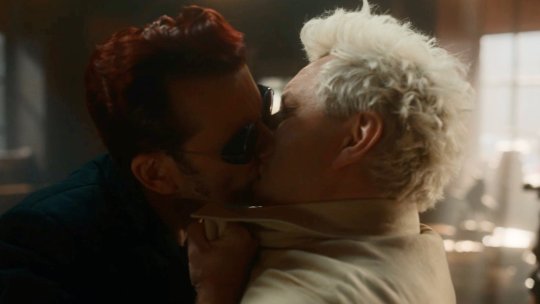
That was a last-ditch attempt from Crowley to get Aziraphale to stay
This is the proof that they love each other
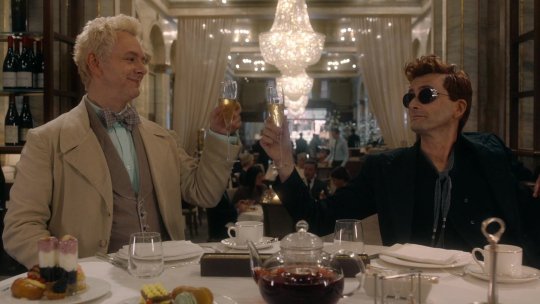
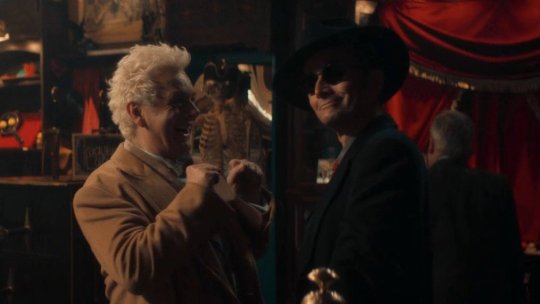
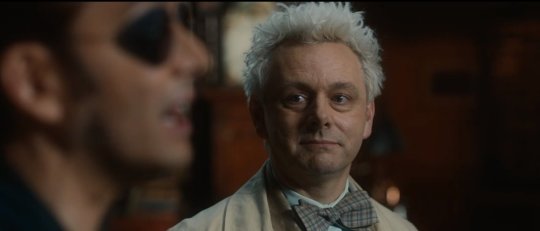
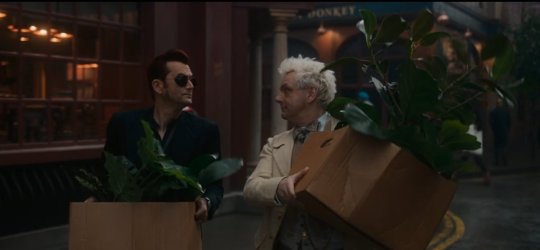
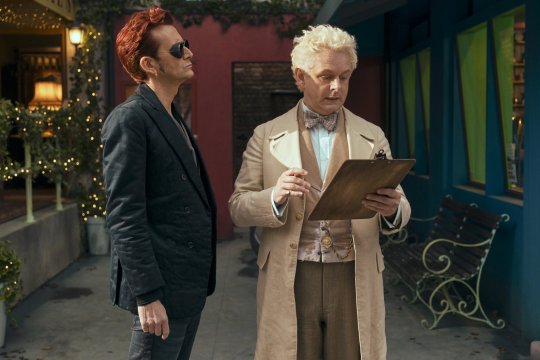
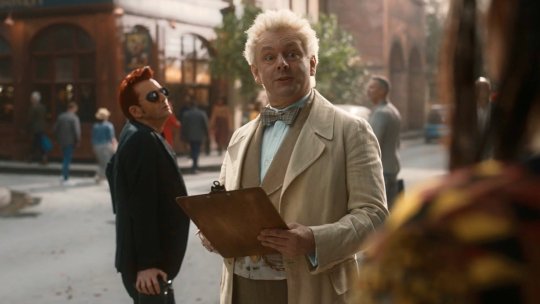
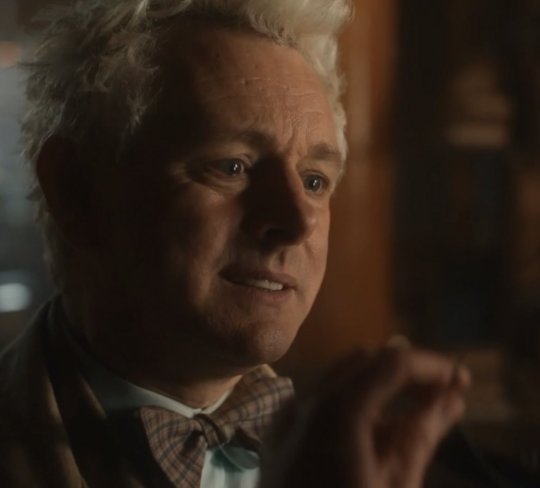
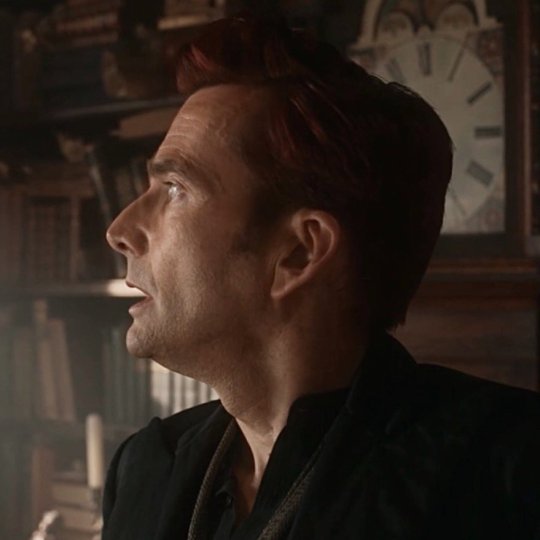
Their love wasn't just made real because they kissed
It always existed
73K notes
·
View notes
Text
I was thinking recently about the people who police other people about how different words and labels are used in the lgbt+ community (e.g. queer is a slur discourse, trans-masc lesbian isn't a thing discourse, that sort of thing), and it got me thinking about how we use labels in general.
Now, I'm not that well versed in the happenings of the lgbtqia+ community to begin with, so take everything I say with a grain of salt (I have been wrong before, I'm only human after all). But with the formalities out of the way, here's my take on it:
Labels aren't designed for you to fit them, labels are designed for them to fit you. The whole point of labeling things in the first place is to give us a shorthand way to talk about them, and make people's experiences easier to understand.
Because the human condition is so varied, if we had a label for every possible human experience of sexuality or gender, we'd be here all day and things would still be confusing (thus defeating the point). So, we use a few labels with broad definitions to encompass a vast array of experiences.
Just because someone doesn't absolutely perfectly fit a label (e.g. a gay man who only likes other men, except for one woman), it doesn't mean they aren't allowed to use that label, or make their experiences any less valid. You don't need to conform perfectly to a label to use it to describe yourself, just the vague outlines. They're all a little bit vague on purpose, and that's to give you the wiggle room needed to have them fit comfortably around you. And in any case, you can still get into the specifics of it if you want, but the labels are still there in case you want or need a quick and easy way of identifying yourself.
In essence, I suppose the labels are better used more like guidelines than hard rules. Heck, you don't even need a label if you don't want one, and that's fine too. Just do whatever you find comfortable, and live and let live, I say.
But hey, that's just my two cents. What do you guys think?
#lgbtqia#i think i may have discussed this before but i don't think i ever formally jotted it all down
0 notes
Note
Your tag #jonathan harker's gender markers got me thinking. IS there a specific word or term for when an author takes a heavily gendered trope and applies it to a protagonist who isn't that gender? I've heard it described as "queering" the thing, which is good and fun to say, but I was wondering if there was anything more explicit or in depth you might know about?
Hmm. I mean I guess I would call it gender non-comformity in the character, is all?
I mean there are a lot of related terms, but while I suspect there is a specific word for this, I don't know it.
But there's all kinds of... well, there's so many related concepts that I barely know where to begin haha. Disorganized thinking? Never heard of her.
Like, in certain contexts where the author's intentions are known and relevant, such as with gay actors in... bluh some time period where being gay on screen was extra illegal. So, in that case, you can call it "queer coding" to say, "these were conscious choices made by the author to express a sexual, gender, etc variance for the character that would otherwise be censored or banned."
But we certainly don't have any knowledge of that sort pertaining to Bram Stoker, no matter how many implications and anecdotes there are. So we can ask "is Stoker queer coding? If so, what could the intended message be?"
But we cannot say "he definitely was queer coding."
Meanwhile, "queering," as in the sense of "queering the narrative" refers more to the act of asking that question and trying to answer it. It's actually shorthand, and the full term "queer reading" may be clearer.
Queering is something that an audience does, rather than an author. It's the application specifically of queer frameworks of gender as a way of interacting with a text.
So, some of the more common examples are like. Well. Literally the act of calling a character "gender nonconforming," which itself requires you to have a working concept of gender norms for the time, and also to know what the hell "gender nonconforming" even means.
Which, I have to emphasize. You'd think it's self-evident but many people stop at "Girl who plays A Sport". Queer theory, as a type of interpretation, can focus heavily on this.
At the way, WAY more granular level, there's also specific trope names for particular ways characters are commonly shown as gender nonconforming. Of relevance to Our Good Friend Jonathan Harker, I would suggest:
Masculine girl, feminine boy
Otherworldly and Sexually Ambiguous
The Twink
Hemo Erotic
Gender Inverted Trope, found by @firecoloredwater
11 notes
·
View notes
Text
some musings on the dynamics between the girls of yellowjackets
I'm fairly certain that one of the main points of yellowjackets is portraying all these different versions of hyperintense homoerotic girls' dynamics that sometimes veer into an actual romantic relationship (tai and van), but crucially Do Not Need To in order to be authentically queer dynamics
jackie/shauna and misty/nat and tai/shauna and lottie/laura lee (and I think next season whatever dynamic lottie/van/misty are gonna have and probably lottie/nat) and more I haven't remembered or will probably appear in s2, they're all queercoded
it's not queerbaiting, it's a series of intense dynamics that you don't often see represented, even in stories that ostensibly are about girls and women. it's letting them be this intense, rather than falling for a sort of heteronormatively acceptable distance you see in... too many things about girls and women... --
jackie loves shauna more than anyone and also tries to "own" her, shauna looks up to/resents/thinks about more than anyone/loves jackie -- that is just canon, that's not in dispute
christina ricci said about misty and nat: “As far as the group goes, Natalie was the best version of an outsider and Misty very much identifies as an outsider, so for her, ‘this is another outsider like me but she’s so cool and she’s an outsider but by choice.’ She represents the best version of what Misty could be but isn’t capable of being, so she sort of covets Natalie’s time and affection. She sort of wants to possess her in a lot of ways.”
tai and shauna having a shorthand of understanding and comforting each other -- the attempted abortion mirroring the baptism -- the attempted bacchanalian orgy/ritual murder -- shauna having literal visions of jackie's ghost -- etcetc -- they're intense and queercoded
the fact that tai and van are the only relationship to have sex/be in a specifically romantic relationship means they're the only ones confirmed as lesbians (although interestingly van is played by liv hewson who is non-binary and I wonder if that will play into the text -- might not, but who knows)
it doesn't mean they're the only characters with intentional queer dynamics -- it's basically the story of a sisterhood/cult/survivors of trauma, of course it's gonna be queer -- they're a seriously messed up found family with one adult functioning unwillingly as parent who is also explicitly gay in the text
when jackie is left out in the cold, she's broken up with shauna, yes, and wants shauna specifically to come out to her and bring her back in, but in the death-dream she has she's not just dreaming about shauna... she's dreaming about all of them. All of them wait with blankets, give her hot chocolate - dream!shauna says it first, but then they all say: "We all love you Jackie"
I can only imagine these relationships will continue to develop in ever more messed up -- and loving -- ways come next season
TL;DR while I get people can feel nervous about queerness in text, in this case writing the characters with messy, not-easily-definable relationships to each other aren't bugs, they're features, especially as there also are multiple canonically queer characters present
this story isn't queerbaiting. it's a five-course meal
28 notes
·
View notes
Text
i can't answer all the questions here partly because i am not sure how to communicate things if u have not experienced them and also bcuz i feel like some of the questions u pose weren't a part of the original poster's point but as im not op, that's just my interpretation.
i will say ive seen a lot of fellow transmascs be extremely misogynistic and move towards trans inclusive men rights activist attitudes towards women cis and trans alike, though especially trans, and extend misogyny to fellow transmascs (like the amount of misogyny in transmed spaces). i don't know if that's what op was referring to, but that's something im anecdotally familiar with that i see a lot by people who identified as feminists before transitioning.
i also think there's probably a fair bit of writing out there about woman as a class being politically necessary, though im of the belief that gender minorities/gender oppressed is probably a better class distinction, with woman specifically being a subclass but that might be a little in the weeds.
generally, i think the post is just talking about a desire from people of all communities, though in this case specifically queer/trans ones, to find ways of perpetuating misogyny and gendered violence within our spaces while finding politically correct explanations for why it is okay, similar to how other bigoted ideas can spread in areas that claim to be against it due to implicit biases and a lack of unlearning what you've been raised with.
i will say for the last question, i feel like i can answer and it is just because there exists words and labels to define a group of people and experiences and there is meaning to that. as long as there are groups of people not attracted to monogender men (lack of better word, but i want to consciously be clear i am not speaking about bigender men who are also women or genderfluid people) or at the very least people uninterested in pursuing any romantic or sexual relationship with monogender men, than a label consequently should exist to allow for linguistic shorthand to describe group experiences. i don't think that the op or anyone is thinking of any measures to Force It That Way, the same way no one is actively policing people beyond social media posts or social arguments from calling themselves gay if they're straight. like, it's just to label an experience for the sake of vocabulary. i do see how this is complicated by the lack of push from gay men to create a firm line between gay (sexuality) and gay (umbrella descriptor of sexuality), but i also don't have the answers for that.
idk if ill reply further after this reblog but i felt a need to give thoughts when i saw your reblog
EDIT: i looked a little more at ops responses and completely forgot about this internet phenomena in recent months of trans spaces that are more misogynistic or that mra Adjacency i described above said that calling men oppressors at all is wrong because of nuance, and i think it's likely this post is also inspired by the assumptions people make that nuance = a class not existing, and how that has political ramifications
i do fundamentally agree with the idea that stuff like 'man' and 'women' dont have to be mutually exclusive, people can identify as whatever they want, and gender is there to be played around with as much as anyone likes. but i do feel like we're seeing a trend amongst some subsets of people where they can't hold those beliefs and Also accept the fact that as it stands 'woman' is still a very real and important political class of people. like it really would be great if we were in a place culturally where gender categorizations werent very politically relevant. but they clearly are. and i feel like a lot of people in an attempt to find an understanding of gender that makes them more comfortable have subconsciously kind of abandoned a framework that calls for a structured women's lib movement.
and it's like, on one side you have large swathes of the population who still aren't fully sold on the whole 'women are people' thing. and then on the other side you have a group who correctly understand that the whole gender thing is pretty bullshit. but then, instead of using feminism as a platform to try and build towards a world that reflects those ideals politically they have just kind of retreated fully into idpol and abandoned the scraps of the feminist framework to the radfems to re-appropriate into. fucking. nouveau phrenology.
it just sucks man it feels like we're sort of at an all time low in regards to public interest in meaningful feminism that i've witnessed in my lifetime.
6K notes
·
View notes
Text
I really hate the fact that I still flinch/get on edge, even for a few seconds, whenever I hear someone (outside of familiar🏳️🌈 comfortable situations) call someone gay in finnish. Like this is not about identity policing, this is about the fact that our word for gay (" Homo") is still being used in the same manner as faggot, amongst teen boys. Ykno, not even always referring to any actual dating behavior, but just used as shorthand for dumbass/loser/annoying/wimp ect. "Oh well I didn't mean it in a derogatory way! It was just a joke!" then why'd you use it as an insult? What's the joke here? You wouldn't be using it in that way if you didn't mean to imply something negative. This isn't a case of queer friends being rowdy with each other, this is indirect homophobia. We do have a derogatory term for a gay person but that's just slightly too controversial to say in casual "joke" mocking. It's only used by actual older generation homophobes, or if you really wanna make it sting. You go white boy, assert dominance over your friend!
At least as far as I've experienced, it's so bad that most people outside of actual genuine gays, use the ENGLISH WORD GAY. Not our finnish word for it, they say "Gay". Bc people still use our word as a slur sometimes, you can never be 100% sure how they meant it. Imagine us not being able to use our own fucking language to describe ourselves. Fucked up world. Some are even considered "radical" or "edgy" gays if they openly use that on themselves or others without batting an eye
When my mom calls me over to like, look at a cute gay couple on TV or tell me about her queer friends, she says Gay, in English, in English pronunciation.
Same with lesbian. In finnish we'd say Lesbo/lespo but people more or less resort to switching momentarily into English to explain that this girl likes other girls. Additionally some lesbians I've known don't even wanna fucking say lesbian, they say gay, Finnish or english. Lesbian is also still used derogatorily so much so that it's not a comfortable word to use regularly like any other word. I also still flinch when someone refers to me as a lesbian. I've literally been insulted with that word, by family members too btw. They say "Lesbian!" as a comeback when I criticize their poor sensitive hetero lifestyle. Fucked up world. We use English instead bc it's a Trendy language, it's international and educated! It's socially correct!
In case anyone decides to come @ me on this: English is great for international usage and lots of Finns having a good understanding of it is helpful in interacting with foreigners or immigrants. As accessibility and education it's a good thing to have. And yea finnish doesn't have original terms for some of the others, like pansexual bisexual, nonbinary in some cases, or anything about the ace/aro spectrums (as far as I'm aware). Yea, we do have "Muunsukupuolinen" as a sort of descriptor for a nonbinary person but it's lengthy and I've honestly never heard people use it outside of formal settings where saying Nonbinary would sound too "pop culture" ish.
Oh yeah, also, saying "Trans" in finnish sounds really clumsy! It's just one letter away from our word for Tranny! ("Transu") If you don't wanna mouth out "transsukupuolinen", get inventive or resort to english pronunciation of the word!
*Slams my head on a desk multiple times*
#My thoughts#This is kind of a vent?#Please ask me first if you wanna rb it#Like I wouldn't mind this circulating to spread awareness or smth#But it's also a sore topic for me and I'm not enthusiastic about thinking abt it too hard#tw homophobia#tw slur#In a very private and personal way I use our T slur about myself#It feels strengthening to identify myself w it but I wouldn't want someone calling me that#Blowing off steam here
9 notes
·
View notes
Note
Sorry; just a point of clarification on my last anon because I think it got lost in me trying to put my thoughts into order. I also experienced quite a lot of "let men just be friends" as a way to shut down "gay shipping" in earlier years of fandom and I think that has also lent itself to a bit of defensiveness about that argument. The point of bringing up e.g. Good Omens was to that end. These days, you'd be hard pressed to find someone who isn't chomping at the bit to see whether Gaiman canonizes a romantic relationship in the sequel, but back in the day there was a lot of "if you interpret this as romantic or ship it, you're wrong, this is just what friendship looks like, let people be friends" that shouted down a lot of the 'shipping. So even though I know you are not doing that, I do still have a bit of a defensive reaction to people using that line because I remember a time when it was used to shout down LGBT interpretations of a work.
Honestly, I do understand that. I remember seeing that too, and I think like with a lot of things related to LGBT issues, public opinion--or in this case fandom opinion--turned really fast, so it's kind of a strange adjustment.
I do actually try to avoid that line for exactly that reason, but sometimes I just can't think of a better shorthand. I'm open to suggestions on that front!
Also, I'm sort of removed from it, because... gay ships just don't mean that much to me the way they do to a lot of fandom-inclined queer people. I think they may have when I was younger and figuring things out, but nowadays when I'm invested in and passionate about a ship, it's honestly just about a story I find interesting. I don't find meaningful representation in non-canon gay ships; I barely find it canon gay ships, but that's another conversation about how I just don't quite fit in here.
So on the one hand I'm like... trying to talk about my experiences in fandom and my desire to make room for platonic interpretations without invoking language that many of us associate with homophobes or implying that shipping is inherently bad or wrong, but on the other hand I don't really relate to the significance of LGBT interpretations. If I want a gay story, I'll find one. I'm not looking for one in M*A*S*H or most of the other media I consume. I know these LGBT interpretations are very significant to other people and I want to respect that, it's just not something I exactly relate to.
3 notes
·
View notes
Text
So on Friday night I made this post:
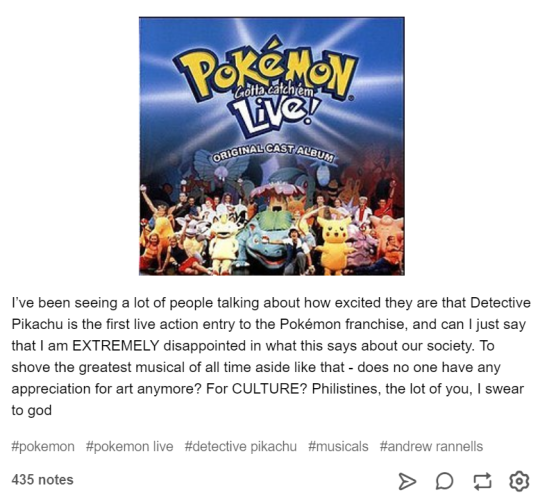
Which I expected that maybe ten, twenty people would see? I didn’t think anyone would really care about a joke about something so old and obscure, and it would just get lost in all the Detective Pikachu stuff. Instead, within five hours, it had become my most popular post.
I know it’s still not a huge number, but it’s still way more attention than I’ve ever received for anything... ever, so I’ve been thinking about Pokemon Live a lot since. Which has been bad, because this morning I had to take a very important political economy exam, and instead of thinking about Bretton Woods or Marx, I was thinking about Pokemon. I nearly referred to my country’s former Prime Minister as ‘David Camerupt’. It wasn’t good.
I need to expunge my thoughts. Specifically, my thoughts on one topic in particular - the way this show treats, or rather mistreats, the character of James. Because I truly, truly love Pokemon Live. I do. It’s one of the most glorious dumpster fires I’ve ever had the pleasure of watching a poor quality recording of. But this is the one thing I definitely don’t love.
I don’t expect anyone to read this. I mean, I said that last time, but this time I really don’t. It’s a long essay on a niche topic, and it isn’t even funny. But on the off chance it’ll get you to stick with me, I promise that there will be pictures of Andrew Rannells cuddling puppies at the end.
So,
How Pokemon Live Mistreats James, and Why It Matters:
The Mandatory Mentioning of The Actor
I’m guessing anyone who knows anything about Pokemon Live also knows that now highly successful, Tony-nominated Broadway and television actor Andrew Rannells was in it playing James. And if you didn’t, now you know why I’ve mentioned him twice now. I’m a big fan of this guy.
He hated this role. Absolutely despised it. Apparently the show was a miserable environment to work in for everyone. The costumes were uncomfortable. The audiences were unbearable. There’s a making of for this show, which can be viewed on YouTube in its entirety - I’ve watched the whole thing more than once and you can see in every cast member’s eyes - there’s no light there. They’re all dead inside. It’s almost heartbreaking.
To be clear - he’s the only one of these people I, or anyone else I’ve seen, ever makes fun of for this show. And that’s because he’s fine. He’s fine! He’s done very well for himself and talking about it won’t hurt his career, and there’s just always something really hilarious about seeing very successful people in terrible things, isn’t there? Chris Hemsworth in Saddle Club, Zach Braff in Babysitter’s Club, literally everyone in Foodfight. It’s not malicious or in any way intended to be punching down - just poking fun at a really good actor’s really bad early work. It’s not even really making fun of him, more that he was in this.
But there is one reason he hated the role that I don’t find so funny, and that’s that he felt the people that wrote the thing had made James a grossly over-the-top, borderline-to-over-the-line (depending on your tolerance) homophobic stereotype. And... yeah. They undeniably did that.
Rannells understandably dislikes the character, and to be honest - that makes me a little sad. Knowing that musical!James is probably the only version of the character he (and likely a lot of parents who saw the show, and other cast members) ever really encountered, that’s a huge shame. Because if we go back to the anime the musical’s based on, the one I, and many others, grew up on, James is quite different. In fact, I personally consider anime!James to be the best character in the entire Pokemon franchise.
Why We Love Team Rocket
Just want to quickly note that I can only discuss the anime up to about halfway through the Sinnoh seasons - I’ve seen basically nothing after that. My childhood was some original series, a lot of Hoenn, and a fair bit of early Sinnoh (somehow skipped over Johto almost entirely, don’t really know how that happened). If any of this is now not accurate, well - it’s not really relevant for this discussion anyway, but I still apologise.
The Team Rocket trio, James especially, is, pretty queer-coded. This is not unusual for villainous characters in children’s media before the 2010s, so much so that I would guess that a lot of the time it wasn’t even being done deliberately - it was just that common a trope that it was all but expected your show would have at least one flamboyantly effeminate, villainous bloke. And James - especially early James - has no qualms about showing his feminine side:
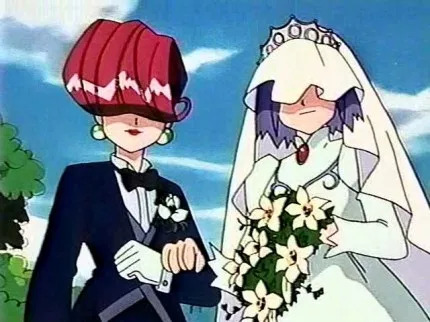
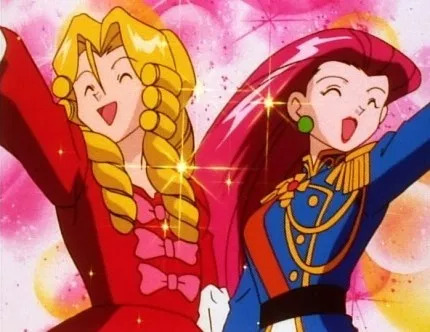
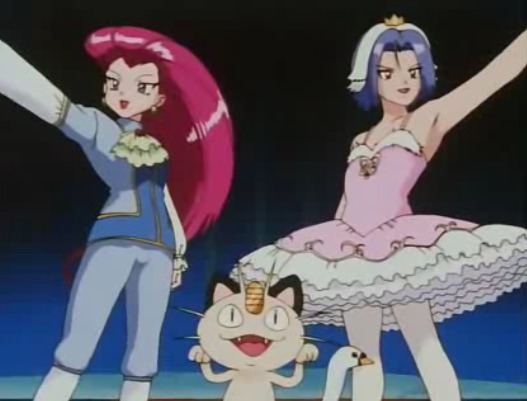
Notice that Jessie adopts masculine attire to match - she doesn’t always do this, but I like that they have her at least do it sometimes.
Team Rocket’s disguises became less and less likely to involve cross dressing as the show went on, but it’s one of the things best remembered about them. James also has a strong association with roses, and possesses several other feminine mannerisms. Arguably he’s far more downplayed than most other villains of the type (even more so than others present in Pokemon - Harley’s a great example, who was also, coincidentally, played by Andrew Rannells), but it’s present. And while yes, obviously in real life none of those things should be taken as definitive indication of a person’s orientation, and straight men are perfectly capable of twirling around in pretty dresses - in fact, I fully endorse it - this is fiction. Specifically fiction from the early 2000s. And in fiction, certain things are intended as visual cues and shorthand.
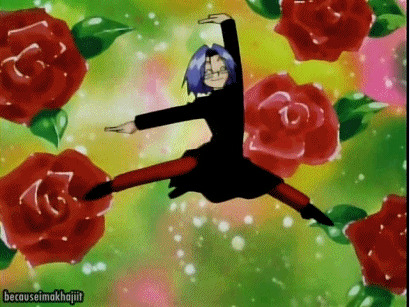
So I really, really doubt we were supposed to think James is entirely straight (I personally have always thought that he’s actually bi, but I’m not opposed to alternatives). You could make the case, but like. Come on.
But how is this different from musical!James? And how is this different than any other villain like him? Very simple. Anime!James has depth.
Not a tremendous amount. It’s a children’s cartoon made to cash in on a popular video game. But he, and Jessie and Meowth, are among the most well-rounded characters in the show’s cast, in a way that’s actually very relatable. It helps that they aren’t actually very villainous people most of the time. I know so many people who grew up with the show that loved, rooted for, and identified with them over the actual protagonists, by a mile. Myself included - I can remember two separate James-centered episodes that made me cry as a kid.
And these three are particularly beloved by young LGBT adults. We know from their backstories that they all came from rough circumstances - Jessie desperately poor and struggling to get anywhere or be recognised, Meowth having changed a fundamental part of himself in attempt to gain love and instead being ostracised for it, and James running away from an abusive household. They’re three people (/Pokemon) who felt alone in the world, that have now found each other. And whether you view Jessie and James’s relationship as romantic, friendship, or found family, it’s far more compelling than any other relationship in the show, at least to me. They may be criminals, but it’s not hard to see why some kids - especially the kids who might already feel like they’re just a bit different - would latch on to them.
Even if you didn’t know James’s backstory, he still has a character. He’s frequently shown to be the most moral of the trio, he has a stronger bond with Pokemon than honestly even Ash - even more of a running gag than his flamboyance is the fact that his pets love him so much that they just wanna hug him all the time, with inevitable slapstick consequences - he has dorky hobbies like bottle cap collecting, and he’s even occasionally shown to be a bit of an environmentalist. Yes he is in many ways a stereotypical camp villain - but he’s also more. And that’s why we love him.
And I’d bet anything there probably were some little boys who watched the show and saw James and thought ‘that guy’s like me!’. And yeah, that guy is a villain, because god forbid a maybe-gay character also be a good guy. But more than any other character like him that I’ve seen, he’s also always been a person. And considering how most of the other options kids like that had at the time were either one-note villains or nothing (and even now it’s sparse pickings) - that’s valuable.
And then there’s Pokemon Live.
*long, long sigh*
Oh, Pokemon Live. You beautiful disaster.
What did you do to my boy?
Is there nothing that better encapsulates it than the bit where James asks Giovanni where Mecha MewTwo (...I know) “stands on campaign finance reform, social security and Don’t Ask Don’t Tell”?
First off, I like that James is politically engaged! Good for him! Completely out of character, but still!
And I do find this line incredibly funny, but I want to be very clear about why I find it funny. The line is funny because referencing a real world American discriminatory military policy in a Pokemon musical is just... so completely absurd. It’s super jarring and when I first watched it, I had to pause it so I could stop laughing about the possible implications of Pokemon Don’t Ask Don’t Tell. Is there a Pokemon American military then? Pokemon Democrats and Pokemon Republicans? Pokemon Bill Clinton? POKEMONICA LEWINSKY???
It just raises so many questions.
Also Rannells’s delivery is incredible.
But the thing is, that’s not the joke here, is it? The actual ‘joke’ is ‘HA HA HE’S GAY! HE SAID THAT BECAUSE HE’S GAY!’. Which gets even worse when you think about it and realise that this situation is really just a gay man (I don’t think there’s any doubt about it in this particular incarnation, is there) asking his boss whether or not he thinks people like him should be discriminated against. How is that a joke? (The answer is that it isn’t.)
Which makes it that much more inappropriate for a children’s Pokemon musical, which is sort of, in a dark way, almost funnier. It’s that juxtaposition of something kiddy and cute with something that definitely isn’t.
But hilarious as I find it, given the chance to I would go back and get rid of that line. I dislike what it implies - that being a gay man is nothing more than a punchline - more than I like the absurdist humour.
And that’s the whole problem with how they chose to write James for this whole thing. They took a really good example of how you can have this type of villain while also making him a good character, and they turned him into nothing more than a stereotype.
You could say ‘but it’s a much shorter story than a TV show! They wouldn’t have time to make him nuanced!’, to which I would say 1. He doesn’t have to be nuanced, he just has to be slightly more than I’M GAY and 2. There have been 21 Pokemon movies at time of writing, two of which came out before Pokemon Live did. None of them, at least of the ones I’ve seen, committed any character assassinations like this. The first one even had another baffling reference to real world America:
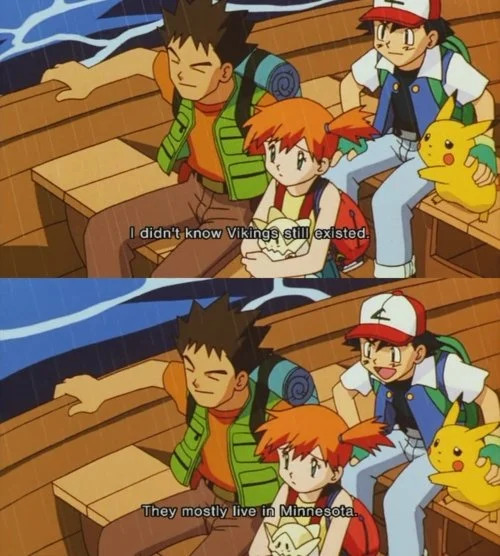
That’s so out of nowhere and silly that I laugh every time I think about it (the Minnesota Vikings are an American football team, if you didn’t know). See, Pokemon Live! It’s possible to do jokes like that which aren’t at the expense of a minority group! Wow!
The anime even has examples of how you can do the gay jokes and make them funny. They are very rare in the show (beyond the humour of James’s personality), but remember the whole Flaming Moltres joke? It’s actually great. It’s a couple of good puns, it’s possibly Rachael Lillis’s best delivery in the whole show, and, just for confirmation, I’ve shown the clip to a few actual gay men in my life, who all said that they think that it’s very funny, and totally non-offensive. The joke is still ‘lol he gay’, but it’s also a neat play on words, it feels very in character for both of them, and it doesn’t have the same malicious, taunt-y feel of the Pokemon Live ‘joke’.
Look, the Pokemon anime is far from perfect. There are lots of moments where you have to grit your teeth and remember when it came out. But it still gave us a really, really wonderful character, and he absolutely deserved better than this.
Do I Still Love Pokemon Live?
Yes.
Even with all of this, it’s still an absolute masterpiece of unintentional hilarity. In some ways, this makes it funnier. Of course, of course, it couldn’t just have terrible costumes and a nonsense plot and really, really bad rapping - of course it’s also kind of offensive. Of course it is. Why wouldn’t it be.
And I would love to talk about all the things I genuinely love about it, and maybe I will one day.
But the thing is, it’s also representative of everything that was wrong with gay-coded characters at the time, something that the show it’s based on came way closer to handling well than most other stuff of its time, no less. And that, as a whole, isn’t funny at all.
So I want to be clear. I love laughing at this show because it’s a weirdly earnest cash-in musical for something that definitely shouldn’t be a musical, with endless bizarre, quotable moments - not because the way it warped this character is actually funny. I love laughing at the character’s lines because they’re absurd choices for a Pokemon musical - not because they’re in any way funny on their own. And I love laughing at the fact that Andrew Rannells was in it because he is so much better than this - not because this is what I think he should be reduced to.
And speaking of, here’s those pictures I promised:
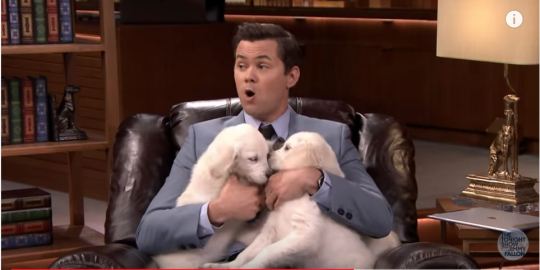
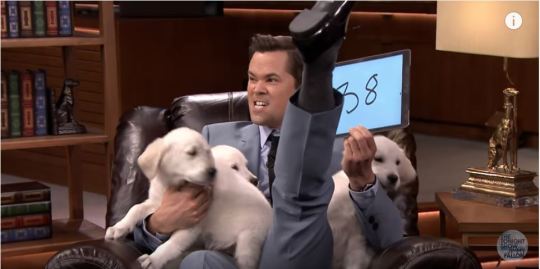


I love one man.
#pokemon#pokemon live#andrew rannells#james pokemon#team rocket#musicals#long post#i cant believe how long i spent on this#ive written academic essays shorter#i think this is probably longer than all my exam answers from this morning combined#long essays about niche topics
63 notes
·
View notes
Text
I agree and I've been thinking about this for a while. After watching multiple decades of fights regarding this matter, I think a good way we can start is figuring out how to describe this while making it clear that three things are happening:
That all gay and lesbian people do not obligatorily have this facet of queer experience
That this exact situation and queer experience can be and is also present in other queer people in general (including bisexuals, but not specifically them.)
This is homophobia, specifically.
The issues seem to arise when people (not you) kind of short hand this very specific queer experience to a thing only accessible to "true" gay people, and follow it up with a lament that bisexual people (by virtue of the ability to hide in het relationships) are spared this. (which I think is what you mean by devolves into biphobia)
Which is difficult because a fair number of gay and lesbian people do not have this lived experience, while bisexual+ people who happened to be gender non-conforming children can and do experience this. Even though it is, specifically, homophobia.
It also inadvertently opens another facet of this argument where people often start talking about "how gay does a bi person have to be to experience this" (a chaotic statement) and also sparks the "You can always tell when someone is gay" historical discussion (awful). And then, as I'm sure you've suffered, the conversation fully derails into arguing about bi people instead of having necessary discussion the OP wanted to about their pain (this happens a LOT with lesbians, which feels lesbophobic to me)
Whereas the conversation needs to be focused on: Children being systemically, socially, psychologically and physically abused due to homophobia (specifically), regardless of whether they are gay, lesbian, bi, trans and in some cases literally just intersex, due to having features that they cannot hide. And the longer term self esteem, social and psychological difficulties from having experienced that as one grows into adulthood.
I think we need specific vocabulary for [perceived queer by external].
So that we can have "I was a [child perceived queer by external] and my identity as a lesbian and ability to develop well was very negatively impacted by this experience."
conversations in which another member of the community can reply
"I too experienced [child perceived queer by external] but because I am trans, this other specific stuff happened that exacerbated my trauma from the [child perceived queer by external] situation, because since they assumed I was a gay boy and not a trans girl, they did xyz [homophobia] to me until I was old enough for them to learn I was trans and then things got worse.
or even.
"I experienced [child perceived queer by external] and I haven't figured out my orientation yet because I am still quite young, but not so young that I haven't already been punished for it."
This should help derail this from becoming about biphobia by separating it from focusing on bisexual people as a singular demographic within a larger group that may deal with this. As well as giving a shorthand to the confusion, shame, anxiety of the [child perceived queer by external] experience.
There absolutely is very specific gay and lesbian experience within [child perceived queer by external] , and I think we would be able to get into the nitty gritty of talking about it without interruptions more often if we had this word/phase, because it takes the wind out of all of those the sidebar derailments at once.
I understand the issues around the term “straight-passing” and I know many of the ways people talk about “straight-passing privilege” are incorrect and unfair. a lot of that bullshit does just end with biphobia
but I do also want to say that like. there is something different about growing up queer in a way that cannot be hidden. there’s something different about being called slurs before you’ve had the chance to figure out your sexuality for yourself. there’s something about never feeling safe around straight girls and always being labelled a sexual predator. there’s something different about never having to come out because everyone decides on your behalf
and I wish I had a way to signal all that without sounding like a biphobic wanker
#queer theory and language#i grew up with an extremely femme bi guy friend whose dad knocked him around and then eventually sent him to military school over [cpqbe]#he had a gf the whole time this was happening#He is now happily married to a man :) enjoying peace and his dad is in the ground#enjoying hell
27 notes
·
View notes
Text
So I Just Figured Out Something Weird About Exclusionists...
So, I was looking through a few exclusionists blogs. Normally, I’d say that was purely a #mistake, but this time it was enlightening, especially about specific claims exclusionists make about asexuality.
So, a good number of the posts I looked at were aimed at lesbian and gay people, which is like normal and nbd. They were about helping questioning people who thought they might be lesbian or gay and describing their experiences as lesbian or gay people. A large number of responses to asks were like “well if you feel lesbian/gay, then you probably are.” which super valid, that’s how it works for LGBT+ people. Except, a lot of the people I saw sending in questions, especially to like bottomsona’s blog, specifically expressed experiencing attraction to multiple genders, but were not at the moment interested in pursuing relationships with men. Most of the responses were tailored around "well, if you're not going to date men, you can just call yourself a lesbian if you are only gonna date women/women-aligned people", which is fine on its own, I’m not the label police.
However, this response was informed by the stance that that lesbian(or gay, or bi, ect) existed as a label to communicate who you intended to date not who you are attracted to. I bring this up because a really common and previously to me super goddamn weird obsession of exclusionists was focused on how "asexual doesn't communicate anything". “How can you be asexual and still date/have sex?” And it occurred to me after reading this that if exclusionists were using sexuality labels as a shorthand for “who I am sexually/romantically available to” and not “who I feel attraction to” without any implication of dating/sex/relationships/ect then all of their “asexuality is a modifier and also doesn’t mean anything and the definition keeps changing!” starts to make sense.
Instead of:
-Lesbian = woman who is solely attracted to women
-Lesbian = woman/woman-aligned person who is solely attracted to other women/woman-aligned people(this definition still has a lot of problems but it's the one that is closest to how they use it)
It's:
-Lesbian = woman/woman-aligned person who is solely interested in forming relationships with women/woman-aligned people
They mean it to communicate like availability, openness, to others about who they are going to form intimate relationships with. This connects with several inclusionists observations that exclusionists seem really fucking pissed about things that don’t immediately signal whether you are available to them or not. Or more accurately, whether you are available to what they understand to be “gay relationships” or not.
For example, this is why they feel asexuality is a “modifier” because in this case it would have to be a combination of “doesn’t desire sexual relationships” and “desires relationships with these genders”, and it’s why they are so obsessed with whether or not asexuals have sex, and with whom, and under what circumstances. Because obviously the only way asexuality means anything if it is communicating that you do not desire a sexual relationship with others.
This also explains why they are so freaked the hell out about anyone saying they are asexual, especially kids, because it would be announcing a specific aspect of your sex life (and why some of them keep comparing it to kinks?? For reasons that used to confuse me.) To them it is only communicating your desire to have sex or not(which is why they find ace spectrum sexuality especially confusing or “not real” or describe it as “just people being normal”.)
This means one of the bigger problems is them operating from the idea that sexuality labels are meant to communicate to others who you'd be open to fucking/being in a relationship with, and not a representation of like your internal experiences of attraction.
This is also one of the reasons why they are so hostile to the idea of “examining your attractions closely/at all” because it ultimately “doesn’t matter”, not if what really matters is who you’d be willing to be in a relationship with and everything else is “incoherent” and “not important”, because your label is supposed to communicate who you’d fuck/date. It is essentially why they are so hostile to a-spec identities, but it also spills over onto other groups.
Attraction, dating, ect are not so clear cut or easily defined for many members of the community, especially Nonbinary people. So a lot of our sexuality labels require more introspection as do our genders. Further, that’s one of the reasons behind the push for NBs to use alignment language(or even have it prescriptively assigned). If you don’t tell others if you are man/woman aligned(and often you have to pick either one or the other!) then they don’t know whether you are someone they could be attracted to/should be attracted to/are included in their attraction label. Or more exactly, they don’t know if you are someone who they would form a relationship with, whether or not they are personally attracted to you.
It is also ultimately, why they are so hostile to queer as a single label. Because while it, as an orientation label, definitely tells you this person is likely “sga” by their standards(which are highly flawed and cissexist lmao), it doesn’t inform you “who”/“which genders”/“how many of them” you are available to form intimate relationships with and so “is useless” and virulently attacked because of it. Never mind that it is often used by people for whom gender is a complicated subject, or picking out which genders they are attracted to is difficult or impossible(m-specs, Nbs, ect), it doesn’t communicate what they feel labels are meant to:
Who are you sexually/romantically available to?
Mind you, the claim that people are ID’in as queer in order to infiltrate the community is even more ridiculous than the one against ace/aro people.
Why?
By their own admittance, and concurrent campaign, queer is seen as a slur by straight people. The chances of some “cishet woman calling herself queer because she pegs her boyfriend.” as so eloquently described by hatetobreakittoyou, existing is literally nil. Like, in what universe are Real CisHets™ going to think "this person is really straight and one of us" about someone who describes themself as "queer"?
This means a person would be literally putting a target on their back...for what? Being an open member of a violently targeted minority group does you no favors. There is nothing for this mythical woman to gain by putting herself through the ringer pretending to be LGBT+!
It’s a coherent, if wrongheaded, expansion of their idea that identity labels need to be completely immediately clear and only exist to tell others if you’d fuck/date them, but it’s an ultimately destructive stance and ideology to have. It’s m-spec antagonistic, requiring that m-specs be both in “sga” relationships and have to be “sga” in order to be m-spec(which is you know also exorsexist). It’s hostile to ace/aro people. It’s hostile to queer people and others whose identity is far more complicated. It prioritizes lesbian and gay people(especially binary ones, and especially cis binary ones). It fractures the community, and it’s one of the main toxic tenants behind a lot of their garbage ass rhetoric.
You don’t have to be open to dating/fucking at every particular moment every gender you are attracted to to be m-spec. Your label says nothing about whether you are interested in dating or sex if you are a-spec. That’s not what these labels have historically or even currently mean in general usage, which is why there is so much cross talk when trying to come to an accord with exclusionists. They are working for radically different definitions of even typically understood sexuality labels.(bi to them means “same and others” and not “two+”, ace means “doesn’t want to fuck” and not “doesn’t experience sexual attraction/attracted to no one”, ect)
Has anyone else encountered these underlying beliefs and would be willing to talk about it? Because I’d like to get some dialogue going so that we can maybe more easily actually understand some of the underlying tenants of Exclusionism.
#ace discourse#aro discourse#ace exclusionist#nb discourse#bi discourse#it's sorta every discourse at this point#because it's like a basic difference#in how they define#sexuality labels and such
743 notes
·
View notes
Text
Kyle MacLachlan Talks New Gay Dad Role, Reaching LGBTQ Youth
In Giant Little Ones, actor Kyle MacLachlan plays a gay divorced dad named Ray Winter parenting a distant teenage son, Franky (Josh Wiggins), who’s grappling with his own sexual identity. I repeat: Kyle MacLachlan, a gay dad. The 60-year-old actor’s range knows absolutely no bounds, inhabiting diversified worlds and traversing genre, from comedy to drama, from soapy to supernatural.
MacLachlan’s first major role was in David Lynch’s 1984 adaptation of Dune (soon, Call Me By Your Name actor Timothée Chalamet will be slipping into MacLachlan’s stillsuit for the forthcoming remake) and two years later, in 1986, he collaborated with the screen auteur again on Blue Velvet, starring alongside Isabella Rossellini. But it was Lynch’s early-’90s cult TV series Twin Peaks that arguably made MacLachlan a marquee name (in 2017, he reprised his role as Agent Cooper in Twin Peaks: The Return).
In his three decades in TV and film and on stage, MacLachlan has played a city official based on first big-city openly gay Mayor Sam Adams, Fred Flintstone’s boss, the guy who fucks Nomi Malone in a swimming pool, Riley’s dad in Inside Out, Charlotte’s husband on Sex and the City, Bree Van de Kamp’s husband on Desperate Housewives, and because why the hell not: Cary Grant’s ghost. Starring in writer-director Keith Behrman’s Giant Little Ones as Helpful Gay Dad was really just an inevitably, but for MacLachlan, Ray is a warm hug of a role he deeply feels is important. One that, as a parent himself, even hits close to home.
Here, the actor talks about raising his son, Callum, much like Ray Winter does, gay fans who slip into his DMs and bears who love his rosé.
youtube
You’ve played dads before. But what about Ray spoke to you differently?
He had a journey in this as well, which I liked. It was really about the connection with his son, and at that age it’s very difficult and made even more challenging by the fact that the parents are separated. Under the circumstances, Franky just doesn’t know what to think or what to say, and I like that (Ray) really hung in there. I think in the original draft he was maybe a little more demanding, and so we kind of softened that a little bit. There are still those issues, but it was really important to me to feel like Ray was there and he wasn’t gonna go anywhere and to remain as non-judgmental as possible.
His presence is always felt, but he’s able to give his kid space at the same time. I appreciated that he tells his son to focus on who you’re drawn to and not what to call it, essentially letting him know that sexuality is a spectrum. How did that resonate with you?
That was a really nice piece of writing on Keith’s part, I thought. Again, trying not to judge. Especially at that age, I remember for myself just kind of trying to find where you fit in, what you’re good at, what you’re not good at, who’s your group. There’s lots and lots of questions and insecurities that are masked by a false sense of identity or control or “I don’t want to hear what you say, I’ve got it figured out myself.” The idea of just being present, it’s the way I approach the relationship with my son, the not judging. I’m not going at it trying to make him into something he doesn’t want to be.
You were the stepfather of a gay son, Andrew Van de Kamp, on Desperate Housewive. Who does the better job parenting a queer kid: Orson Hodge or Ray Winter?
(Laughs) Orson, bless his heart. You know, he had good intentions, and there was an understanding there at attempting to connect. I don’t think Orson was ever comfortable in that role. I think Ray is more conscious and he’s a champion, in some ways, for anyone who’s being judged. In this particular case, it’s “hang on a second.” He’s sort of about turning the page: “Let’s look at this and what’s really happening here.” I liked that. And he does it with an inner strength and a firmness, but it’s not without a wry sense of humor, and that I liked about him too.
youtube
When were your eyes first opened to having an LGBTQ following?
I think it was probably with Blue Velvet, I guess. Thematically it expected so much of the audience and it told a story that was so unusual and so true. That sort of started it, but I think with the advent of social media, suddenly it’s really obvious and present. And it’s great.
How has it become obvious through social media?
Just through comments, and its fun to read and great to feel the support. And then because so much of it is built around David Lynch, there’s a real shorthand just in terms of terminology and phrases, and because of David’s visuals and his images and his dialogue, of course.
I have a friend who says Blue Velvet was responsible for his sexual awakening. Is that what gay fans tell you on Twitter?
(Laughs) Maybe not quite so personal! But you know, that’s film. Film is all about experiencing something and having your eyes opened, and I think that film in particular was about that; the exploration of it and the themes of it were so interesting, and they hadn’t really been dealt with that much.
What kind of attention did Showgirls get you from the LGBTQ community?
(Laughs) I don’t think it found its camp niche until a little bit later. It had to go through the “Oh my god, this is perhaps one of the worst films ever made” reaction and then people sort of said, “I think it was, in a way, a guilty pleasure.” Then that began to grow, and there’s a true hardcore following of it and that’s really fun. I’ve never said, “Oh yeah, in fact, actually, that was the intention,” or, “Oh yeah, it’s a great film” – it’s not a great film. But it succeeds at a level that I think is still entertaining and fun. And why not? That’s our business.
youtube
I was at a gay bar once and they were showing Showgirls on all the TVs. When you shot that film, did you expect for it to live on in the LGBTQ community like it has?
I think we all entered into the film – certainly, I did – looking at the creative side of it. So you had really talented people – (director) Paul Verhoeven, obviously – and I think his intention was to do something that was sort of hard and cutting-edge and exposé and I think it kind of got away from him a little bit and became something else that was unexpected. But at the same time, we’ve all embraced it and said, “This is where it went,” and I gotta say, the film was probably gonna have a much longer life because of how it ended up than if it hadn’t. If it was a film that we intended to make, it would’ve been great and fine and OK, but now, it will live on forever.
Particularly at gay bars.
At least there! And midnight showings!
For 2004’s rom-com Touch of Pink, what was special about portraying the ghost of Cary Grant who gives advice to a gay Muslim man?
It was really fun. First of all, just the research alone was great. Getting to watch all the films, reading up about him, who he was as a person and the business side of things in Hollywood and how he really, really created this persona, which I think he tried to get away from but it was what he was known for. So I loved the research of it.
And the director, Ian (Iqbal Rashid), whose story this actually was, was so lovely and I see him occasionally when I’m in London. He’s just a terrific person and a very, very talented director, and I was flattered. He had actually seen me on the stage doing a new play with Woody Harrelson and I don’t quite know how he got there from that performance (laughs), but he thought I’d be perfect. So that’s a pretty big mantle to try to take on, and so we sort of softened that a little bit and said he’s more the spirit of Cary Grant – he’s not exactly Cary Grant. But I enjoyed stepping in those shoes and trying out that language and that kind of attitude and that whole thing. And it’s got a beautiful message, and just the ending when he has to let go, it’s very touching, I think.
In 2018, you were honored with a Dorian acting award by GALECA, the Society of LGBTQ Entertainment Critics, for Twin Peaks: The Return, and in 2009, Desperate Housewives received Outstanding Comedy Series from GLAAD. Is there something special or distinct about having your work acknowledged by LGBTQ audiences and organizations?
Yeah, those stories, if they can speak to a community and there’s a resonance there, that’s the goal of this. They should be universal, but I think that if there’s a relationship that can be created then we’re doing a good job; something that’s worthwhile that creates an emotional response and a connection, that’s really what you want. I mean, that’s what I want.
You played the mayor of Portland in Portlandia. Do you think that character would make a good mayor of Twin Peaks or Wisteria Lane?
(Laughs) He wasn’t a really good mayor – but he was incredibly enthusiastic! I think that was the fun of it: He always got things a little bit wrong but they kind of ultimately ended up OK, with the help of Fred (Armisen) and Carrie (Brownstein), certainly. But, oh god, at least it would be a lot of fun to have him as a mayor of any community, I think.
Why haven’t we seen you in more openly gay roles?
(Laughs) It’s a good question. You know, the work just kind of comes, and it’s one of those things where once it sort of filters through a little bit of whatever it does in Hollywood it finds its way into my inbox and you take a look at it.
Have there been gay roles you’ve turned down?
It’s always about the quality of the material, so if it there was, it just wasn’t worth telling.
But then you read something like Giant Little Ones.
And you know that it is a beautiful story. I had the reaction that everyone had: This is a story that needed to be told, and for any kids out there who are having this kind of “I don’t know, I don’t know” and they don’t have anywhere to turn, it’s like, well, we’re not the answer, but we’re at least an experience to say, “You’re not alone.”
And a reminder to your own son that his dad is OK with whomever he becomes or wants to be.
In fact, he attends a school in New York and it’s all about that. It’s all about the acceptance of everyone, and it’s a wonderful thing to watch because that wasn’t my experience growing up. Public schools, small town, very conservative. Not unlike the situation of Franky, there was a lot of “however tough you are” and “whatever sports you play,” those are your identifiers. It’s nice that he’s having a completely different experience.
In your spare time, you are a winemaker. Are gay men some of your most loyal rosé buyers?
(Laughs) I should hope so, for god’s sake! Rosé is one of those crazy things: It just keeps expanding and people love it and now it’s not just for summer anymore, it’s not just for the Hamptons anymore. It can be year-round and, yeah, it’s been really fun. And yeah, very supportive.
In a queer context “bear” means a hairy, chubby gay man, so it can’t hurt that “Pursued by Bear” is the name of your brand.
You know, I was really going after the Shakespeare play, obviously, but yeah, not unaware and I thought, that’s kind of funny. There’ve been occasions where I’ve met a few guys – bears, you know – and they’ve said, “Oh yeah, I’ve got this in my cellar.” And it cracks me up! I’m like, “Fantastic, I’m glad you like it.” Its good wine and it should be enjoyed.
from Hotspots! Magazine https://hotspotsmagazine.com/2019/03/27/kyle-maclachlan-talks-new-gay-dad-role-reaching-lgbtq-youth/ from Hot Spots Magazine https://hotspotsmagazine.tumblr.com/post/183750970250
2 notes
·
View notes
Text
Pride Week Three: Aro Community & Relationships
Following up with the week three questionnaire from @aromantic-official.
1. What is your favorite aspect of the aro and arospec community?
Most people I’ve met in the online aro community understand and practice the core values of intersectionality. Also the aro community talks a lot about how broad and different experiences can be from one individual to another, not just in being aromantic, but in being queer in general. Another thing I like about the aro community is how many people in it are trans. It’s been a better trans space for me than any other trans community I’ve encountered, even though it’s not a trans community.
2. Are there any notable differences in your experiences in this community and other LGBTQIA+ spaces you have been in?
Most queer communities I’ve been in don’t understand intersectionality, heavily favor able white middle-class experiences, and fail to adequately challenge patriarchy and exploitative capitalism. The aro community understands the basics of all this, at least, and in some cases is pretty good at challenging these aspects of the kyriarchy.
A lot of queer communities I’ve encountered claim to represent the entire identity but then heavily favor one particular experience or narrative. Mainstream queer narratives especially get favored, like focusing on monogamous romantic gay coupling, or focusing on the medical aspects of transitioning. Many IRL queer communities I’ve encountered actively engage in respectability politics, which I find reprehensible. The online aro community avoids all these pitfalls.
Also the online aro community is by far the youngest queer community I’ve been involved in. But even though I’m 10-20 years older than most people in it, I feel more welcome and accepted for the reasons I stated above.
3. What’s one way that the aro community could be better or more inclusive? Do you have any tips on improving in this regard?
Be even more intersectional. There are limits to this when a community is an online community because there’s not a whole lot we can do to reach people who don’t have internet access. But I have noticed the community is mostly western. Amplifying aro voices from regions outside the west would be good.
4. Do you think there are flaws in the way that different types of attractions are navigated, discussed, and defined in the aro community?
Oh absolutely. My last post covered this some. But the biggest problem I see is that the aro community focuses too much on defining the aromantic experience as lacking something that is present in the alloromantic experience. I think this is reductive and detrimental to aro representation and visibility. The focus on lack is even in the name, with the “a-” prefix. I think the reality for most aromantic people is far more complex, and the current focus ignores all the ways we experience intimacy and attraction and relationships that most alloromantic people do not. There is so much more to being aromantic than simply not experiencing romantic attraction! We need to talk a whole lot more about this as a community.
A good example is that I see a lot of aro people complain about how hard it is to find friends who prioritize friendship, or intimacy in friendships, or are willing to make commitments in friendships. I think most aromantics experience intimacy in fundamentally different ways from a lot of alloromantics that can’t be explained by simply an absence of romantic attraction. Not to mention that defining it primarily as a lack of something plays into amatonormative narratives in ways that are harmful to the representation of aromantic identities, and it’s misleading to questioning arospec people who do experience some form of romantic attraction. I’m sure some individuals experience being aromantic as primarily just a lack of romantic attraction, but I think the community as a whole focusing on that in our core definition is a bad idea. I’ll write a post about this in the future.
5. Do you consider yourself nonamorous, amorous, aplatonic, experiencing queerplatonic attraction, etc., or do you not use those terms? Are you romance positive, neutral, repulsed, or don’t use those labels? Do these answers intersect?
Labels are tools. Sometimes they’re useful, sometimes they’re not. Sometimes different tools are better in different situations. I’ll use some labels sometimes and other labels other times. But most importantly, labels are the tools with which we communicate meaning about identity, but the labels themselves aren’t the meaning.
But in general, I’m pretty amorous. What I mean by this is that I like sex and I love many kinds of affection, especially words of affection and touch. I love cuddling and it’s a core part of intimacy for me, and any intimate relationship for me that lacks cuddling is fundamentally unfulfilling (though it can still be satisfying in other ways). Emotional intimacy is the most important thing in the world to me.
I don’t care for the word “queerplatonic” because I think it’s reductive for the kinds of experience people try to describe with it and it invokes the platonic-romantic binary. I am interested in the kinds of relationships people usually describe as “queerplatonic” but I prefer the label “partnership” in most cases. Also, for me, I would not call these relationships platonic at all, so that’s another reason why I don’t use that label.
I often say I’m romance positive, but I’m not actually; it’s just a convenient shorthand that roughly communicates something vaguely accurate about my experiences. What I mean by this is that enjoy some things that amatonormativity says are romantic, but to me they aren’t romantic. For example, I love kissing and making out, but I don’t experience romantic attraction. So to me, kissing isn’t romantic and I’m not kissing for romantic reasons.
6. Have you ever been in a relationship you would consider committed, such as a queerplatonic/quasiplatonic, romantic, soft romo, friends-with-benefits, or others? How did being arospec affect that and the boundaries you set?
Yes, I’ve been in pretty much all of these kinds of relationships. I’ve been in about a dozen romantic relationships. But all of this was before I came out as aro, so I wasn’t really setting boundaries to address my aro needs for the most part. I just endured repulsion because I thought it was an inherent part of intimate relationships. So for me, because I didn’t realize being aro was a real thing, being aro in these relationships mostly meant that I was miserable most of the time because I had no way to tell my partners that I was feeling repulsed or that I wanted things different from the normative relationship models.
But being aro also gives me a kind of perception into romantic norms that a lot of people lack. For example, I dated a Marxist feminist for a while, and she taught me about feminist critiques of romantic relationships, and I was able to pick up a lot of this very quickly because the flaws of romantic social constructs and institutions are painfully obvious to me. This is similar to how trans people have a perception into gender norms that cis people lack. The socialization on these topics doesn’t feel “natural” to us in the same way that it does to others.
Right now, I have no idea what kinds of intimate relationships I want in the future. I just know I want to try different things now that I know I’m aro. I want to break the normative models of intimacy even more.
40 notes
·
View notes
Text
I chalk it up to these things:
Biphobia, both internalized and externalized from the community; women who date and fuck men in queer spaces are looked down upon in ways that are very blatantly both sexist and biphobic, especially when they date and fuck "cis passing straight" guys like me. They're read as "less queer", as pickmes, as traitors to their community, etc, hence why the huge emphasis on twinks and femboys is a pretty common outlet for these people who want to fuck guys but don't want flack for doing so. Again, it's not a problem to have preferences, there's plenty of genderweird people who like dating genderweird people, there are plenty of women who like dating and fucking feminine dudes, but with these women it feels more like a cope than a genuine source of happiness and attraction a lot of the time, it feels compulsive. I mean, why else would you put such huge emphasis on it around the clock?
People are afraid of losing something I refer to as "their queer street cred". This is probably just the intersections of biphobia and misogyny at play again but I digress, in my specific case as a masculine straight dude these women may worry about being unfairly judged by their friends and peers if they're seen with me. I'm seen as a threat just by virtue of being attracted to their friend and making her happy. To which I say, "make better friends, preferably onees who mind their own fuckin business", lol.
Radfem Kool Aid means a lot of these girls walk around thinking men are going to be dangerous and harmful to their safety and wellbeing by virtue of existing in their proximity, and the way masculinity is policed in the queer community a lot of these girls internalize the idea that the "less manly" you are, the less likely that guy is to hurt you, and the "more manly" you are, the more likely he is to be aggressive and stupid and sociopathic. I don't think it's entirely unfounded, considering how hostile men (especially straight men) can be / are about transfemininity, considering a lot of the baggage a lot of trans women have with masculinity and growing up in male dominated spaces as someone who didn't like being a man (it's no coincidence that a lot of the traits these girls are wary of are the same traits a lot of their bullies tried to enforce on them in their public school days), and the fact that a lot of trans women identified as nonbinary / fem gay guys / etc before coming out, gender nonconformity is probably just more familiar to some of them, and at the end of the day a lot of trans women just want to fit in and be acknowledged by other women even if it's in reactionary and futile ways. I get it. Cis boys default to misogyny around their friends for this, a lot of trans guys early in transition do the same, we all do this. We're human. But those macho bully men are / were making very conscious decisions to be bad people and that sexism isn't going to help you. Violence and hostility are not integral to manhood or masculinity, both of those things are gender neutral in nature. Those guys were just idiots. I can't force anyone to do anything they don't want to do and I don't want to, it's not my style, but there genuinely are men out there who are going to be kind and considerate and acknowledging you as a woman and be attracted to / endeared by you no matter what, and that's worth taking into account just as much as trauma is.
Trans women's communities are very insular. To the point that I can be following a person I know irl and see her casually post "lol I forget trans men exist on a daily basis" and that I can hang out with a group of girls IRL and be the only guy in it at any given time. I was talking to some transhet friends yesterday about how being "T4T" in transfem spaces is just a shorthand for "I only date and acknowledge the existence of other trans women". I get it, a lot of trans women are alienated and ousted and conspired against in queer spaces to the point that they have no choice but to hang out with other girls and/or genuinely only feel safe hanging out with other girls. But that's unsustainable and leaves you just as prime for manipulation as anything else, tbh. In the past couple of decades trans spaces have made a pretty radical shift to being super duper gay and super duper insular, to the point where I hear stories from a lot of girls that are like "yeah I only ever really heard of trans women who date men in degrading and negative contexts and I've only ever seen trans women gas up their relationships with other women, so I didn't really think dating guys was even an option." It's peer pressure, it's wanting to fit in with other girls, it's the classic "wanting the popular girls at the lunch table to laugh at your jokes, even when they're really shitty and lose you other friends along the way" ordeal we all experienced in middle school, it's an echochamber not too dissimilar from cult mentality ("if I'm not doing what everyone else is doing I'll get hazed and possibly pushed out"), it's a whole lot of things.
I'm sympathetic, but at a certain point you just have to stop caring about what other people think. I'm 25 in a week and I pretty much exclusively date women my own age and I just don't have the patience to hold someone's hand through basic shit at this point in my life, regardless of how trans or female they are. I already know what I want. I say this not from a place of judgement or bragging but as someone who had to do the same as a straight trans dude who was surrounded by a lot of the "men are evil and bad and incapable of loving women" mentality in lesbian spaces in the 2010s and only really broke free of it when I realized those people were wrong and I wasn't actually doing any harm by simply existing, that no one had it out for me and if they did that was entirely a "them" problem and not a "Kevin" problem. Do whatever you want but do it cus you like it, not cus you think it's what you "should" be doing or because your friends are doing it.
It's really fascinating how casually radfem rhetoric and gold star lesbian stuff weaseled its way into trans spaces and how casually that shit gets thrown around.
7 notes
·
View notes
Text
unpopular opinion ahoyyyy
what I say: I ship Brainstorm/Nautica
what it sounds like I mean: I want them to make out and have sexytimes
what I actually mean: I wouldn’t actually change anything about their current dynamic of idiot nerd besties that have small intimate moments like hand-holding; but I don’t know how else to express how much I love their relationship in one word - I can’t figure out where the fuck the line between romantic and platonic love should be drawn because I’m aromantic and don’t fully understand what one of those is, and as a result I choose to headcanon them as somewhere on that weird-ass spectrum but not on one end or the other; trying to describe it as either one or the other doesn’t really work so I leave off any further descriptors
also I don’t want them to have do the nasty with each other; I don’t want anyone to bang because I’m sex-repulsed and keep that element out of every single ship of mine
elaboration in no particular order: 1) being aro-ace I don’t understand why a platonic relationship can’t be just as important, or more important and fulfilling than a romantic/sexual one, or that without sex/romance in a relationship it’s just not as great; but “platonic relationship” seems, to society at large, to mean “just best friends” when that’s not always the case, and because of that describing it as “just platonic” doesn’t cut it for me; 2) like I said, I have no idea where to even separate what counts as platonic or romantic, and it can vary so widely between individual cases what counts as something you’d do only with a romantic partner vs. what you can do with a close friend, so what some might see as romantic another might see as close platonic love, and I waver a bunch on whether I’d consider the ship one or the other but I say I’m okay with it either way; 3) they’re already amica endura and it’s the closest damn thing I’ve ever seen to a fictional equivalent of queerplatonic partnerships, and I choose to see them as having the capacity to be happy being each other’s queerplatonic life partners/most important people in each others’ lives and not need any other big relationships in addition, so “ship” or “OTP” is still the best shorthand for me to describe it
idk with the series ending soon, and the recent little displays we’ve gotten so far in the comics that have resulted in people getting irritated with Stormy Seas implications over the other more popular “gay ship” options for the two (Perceptor for Brainstorm, Velocity for Nautica), I’ve been... mulling a lot. not gonna get into why I don’t ship them with said other options here because that’s slightly besides the point but if asked I may elaborate. I realize I don’t owe an explanation to anyone about why I ship what I do, or why I should have to explain why I don’t see it as a strictly “hetero” ship and that makes it more acceptable than an actual “hetero” ship. but for some reason I still wanna put this out there.
*I’ve put “hetero” in quotes because of how hetero-appearing couples could be made up of people that are bi/pan/ace or outside the gender binary, it doesn’t mean they’re straight, and also while they’re absolutely the majority, straight couples aren’t by default inferior to queer ones
#feel free to ignore#shut up acro#whoops hello I'm rambling about ship feelings#in the act of doing so tho I've set myself up to be a target of arguments and drama so we'll see#not tagging this with any big fandom tags but knowing how the search option works#time to brace myself#I'd also like to state that I don't intend to be trashing on said other ships and everyone can ship what they like#I'm just talkin about my own feelings
5 notes
·
View notes